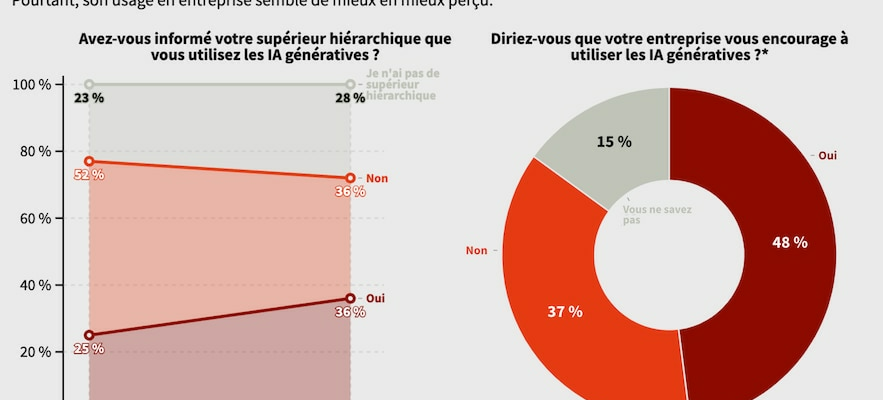“I really feel like Chatgpt has democratized knowledge,” enthuses Pierre*, a 31 -year -old lawyer who uses the application daily. “I use it for less precise, more conceptual research, he comments, if I need to find Beyoncé’s birth date for example, I will use Google, but when I need to understand Something more complex is to Chatgpt that I turn. ” By browsing his latest research on the tool of artificial intelligence, the young man evokes an exchange on the functioning of a water pump, a request for translation of an American song and even a philosophical discussion on … “The human consciousness “. Ironic, if any.
Like him, very many users have made “chatbot” developed by the start-up Openai, one of their favorite tools. At the beginning of December, during a meeting organized by THE New York Times,, Its leader Sam Altman has announced that Chatgpt now has more than 300 million users per week (more than four times the population of a country like France).
For the moment, it is in the private sphere that Chatgpt has inserted with the most success. In His last barometer On “French and generative AI”, IFOP explains that 25 % of those questioned used these tools and that among them, more than 8 out of 10 use them in the personal framework. This is the case of Pierre but also of Alice*, 30, which launches the application between 10 and 20 times a day. “I tell him what remains in my fridge and he offers me menus, recipes according to my needs,” says the young woman, who uses AI as a personal assistant. In recent times, it has also planned its next vacation with the application: “I find that it is a great tourist guide,” she said.
For Claire Lobet-Maris, professor emeritus in digital sociology at the University of Namur (Belgium), this grip of the application on our daily life is partly “to greater solitude, a greater difficulty of building and ‘Being yourself in this society where traditional institutions such as family, state or religion have lost influence and are less present to help us to trace our route. ” In this sense, the conversational aspect that Chatgpt introduced is a real asset to democratize AI: it becomes a “pseudo-human companion with whom to converse and to rely to make its decisions”, still points the researcher Belgian.
Result: AI quickly gains in notoriety. Between the first two waves of the Ifop barometer, the number of users increased by 16 to 25 % and almost 80 % of those questioned had already heard of generative AI. On the other hand, a SopraSteria consulting firm surveycarried out a few months after the launch of Chatgpt shows that 38 % of those questioned exclusively emit positive feelings with regard to the application, against 25 % who only emit negative perceptions.
Omniprence media
With Chatgpt, Openai has succeeded in a tour de force: imposing artificial intelligence in the media sphere. Since the launch of his chatbot at the end of November 2022, the number of AI evocations in the main French television news has been multiplied by at least four, according to INSI data. Since the beginning of 2023, artificial intelligence has almost always been the subject of 35 mentions per month (with only a little slowdown during the summer of 2024, at the time of dissolution and the Paris Olympic Games).
The application is now hegemonic: Ifop stresses that around two thirds of users of a generative AI use Chatgpt. Its main rivals are gemini (only 15 % of users) and the bing chat assistant integrated in the Microsoft suite (13 %) for text generation and Adobe Photoshop IA for image generation.
In Alice’s business, an American fintech with a Parisian antenna, the conversational agent was even completely integrated into the habits of the company. “We have secure access internally, describes the 30 -year -old, I use it daily to write or correct my emails, especially when I communicate in English … or when I try to manipulate on Excel.” Today, Alice admits that she would not want to do without the application at work. And moreover, like almost half of the people using AI in the professional context, his business encourages him to continue on this path.
Today, more and more companies are encouraging their employees to use generative AI.
© / Mathias Penguilly / L’Express
“Today, the Internet is exploding information and we are reaching our limits in terms of processing these, underlines Claire Lobet-Maris, therefore, the functioning of these well-framework tools with the expectations of our time.”
Faced with an accelerating world, Chatgpt and its rivals come to fill a need. For several months, Pierre, the lawyer, found himself unemployed. “I used Chatgpt a lot to prepare my job interviews,” he readily admits, if only to keep me informed of the latest developments in the regulations. ” Now that he has just found a job, does he imagine using the application at work? “No doubt,” he said with conviction. It’s all about productivity gains. He explains again: “The application brings out the protruding points, she chews my work.”
You still have to know how to use it well. At the University of Namur where Claire Lobet-Maris teaches, “all sections, from medicine to the right, of the right to letters” have training for the use of Chatgpt. We study there “the functioning of these tools, the way in which the answers and the bases on which they rest are built, explains the sociologist, the most important in these training courses being to learn what we can” delegate “to these tools … And what should only depend on us. “
*The first names have been modified.
